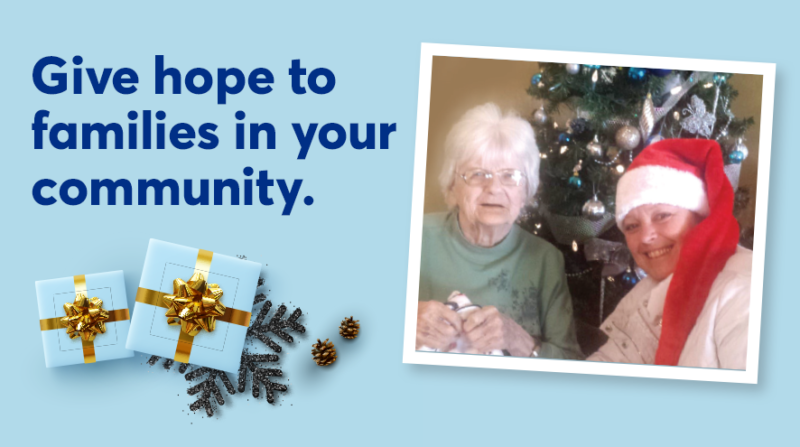As I’m sure you can imagine, caring for someone with dementia at home and trying to manage the stress of the holidays can be a logistical and emotional trial.
The first year after my mom’s diagnosis, we were able to keep up our holiday traditions. She stuffed the turkey and basted it all day long, while my dad carved it at the table like he had since they first got married in 1951. We cracked nuts by hand and ate too many clementines. We played Yahtzee and listened to Burl Ives. For us, it’s always been about more than the gifts. It’s been about the meal, being with family, and making memories.
My fondest of these memories is putting together the butter and flour with mom to make our annual shortbread cookies. My daughter and I continue this tradition today with the cookie cutters mom passed down to us. We all have our traditions.
I wasn’t calling the Alzheimer Society as often in those days.
But then things changed, as they do. My dad got sick, and when he passed, it was up to me to care for my mom. I was working full time, raising two teenagers, and grieving. That’s when I really started relying on the Alzheimer Society and realizing the importance of having that connection.
Being able to call Jenn (my “Dementia Coach”) to get advice and counselling, quickly became a lifeline. I phoned Jenn a lot. There were days when I couldn’t even talk, I was so emotional. But she would say, “Take your time, Lori.” Jenn would help to ground me, and if I had phoned five times a day that would have been alright. I never felt like I was bugging anybody when I called.
The following year, I wasn’t sure what to do. Should we celebrate the holidays in Mom’s house or in our apartment? Is she going to be thinking of Dad the whole time? Jenn helped me understand that a familiar environment would be better, and to let Mom grieve how she would. “Don’t try to avoid it.” So that’s what we did.
We decorated her house with her old decorations. My son pulled Mom’s stove out and plugged it back in (we had unplugged it for safety), and we cooked the turkey there so she could enjoy the smell. It turned out that she didn’t remember Dad was gone. She thought he was out somewhere and would be coming back. She didn’t seem to feel that pain.
Time and the dementia marched on, and as is so common for care partners, when my mom was ready to go into long-term care, I struggled a lot with guilt. Jenn reminded me that this is a natural feeling and not to avoid it.
We started to sign Mom out overnight and bring her home to celebrate Christmas with us. Then one year she wouldn’t get in the car. She said it was too cold to go out and simply refused.
You never expect holiday traditions to change, and my heart broke.
I have beautiful holiday memories and sad ones. Old traditions and new. But one thing was consistent – I was always able to count on the Alzheimer Society thanks to the support of donors like you.
Your donation will support care partners and people living with dementia plan and navigate the life changes that come after a dementia diagnosis.
Evidence shows that the earlier people begin to learn and strategize about coping with dementia, the better they can provide support over time. The Alzheimer Society will help you manage care planning, grief, preparing for the holidays, and reducing stress. They will help you in your time of need and connect you with people who know what it’s like to experience the impact of dementia first-hand.
From the bottom of my heart, thank you for considering a gift to the Alzheimer Society. All the best to you and your family for a safe and happy holiday season.
With love,
Lori B.






